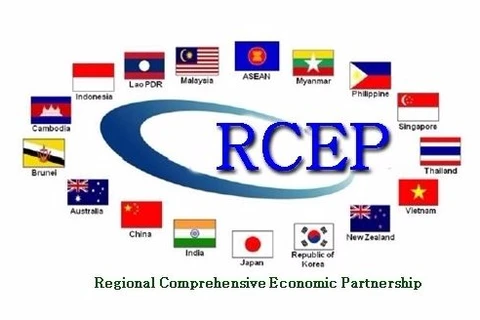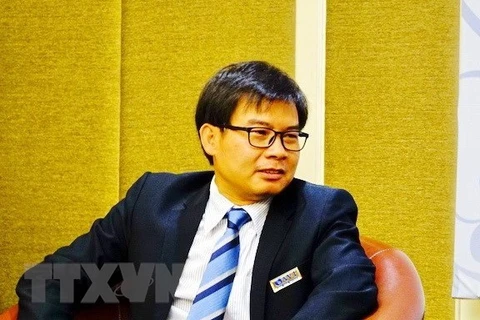Hanoi (VNA) - The Regional Comprehensive Economic Partnership (RCEP) agreement, expected to be signed on November 15 within the framework of the 37th ASEAN Summit in Hanoi, will be the world’s largest free trade agreement (FTA) and is a significant boost for ASEAN businesses, including those in Vietnam, according to insiders.
Initiated by the Association of Southeast Asian Nations (ASEAN), the deal is between ten member states of ASEAN - Brunei, Cambodia, Indonesia, Laos, Malaysia, Myanmar, the Philippines, Singapore, Thailand, and Vietnam, and the six ASEAN partners - China, Japan, the Republic of Korea (RoK), Australia, New Zealand, and India.
Once it comes into effect, the RCEP will create a market covering nearly half of the world’s population, or about 3.5 billion people.
ASEAN - A market of potential
Compared to developed markets such as the US, the EU, or East Asia, ASEAN is not overly demanding but a good market nonetheless for a wide range of products where Vietnamese companies hold competitive advantages.
Home to about 650 million people and with GDP of around 3.11 trillion USD, ASEAN is a key market for Vietnam and where “Made-in-Vietnam” products initially test their strength before reaching out to the world.
Vietnamese companies will also benefit a great deal from tariff reductions under the ASEAN Trade in Goods Agreement (ATIGA).
Most enterprises, however, have failed to take full advantage and boost exports to the market.
According to the Ministry of Industry and Trade, Vietnam has run a trade deficit with ASEAN over recent years, with import revenue accounting for 55 percent of total trade, but the country has been working to close the gap in the near future.
Vietnam shipped nearly 25 billion USD worth of products to ASEAN last year, up 1.3 percent against 2018 and 30 percent against 2016.
In October alone, the country earned 18.9 billion USD from exports to ASEAN, but outlaid 24.4 billion USD on imports from regional countries, down 11.4 percent and 8.5 percent, respectively, year-on-year.
Key export staples included telephones and parts, computers, electronic products and parts, and garments and textiles. Imported goods were mostly equipment, petroleum, computers, and electronic products and parts, among others.
Thailand and Indonesia have surpassed traditional markets like the US, Germany, Japan, and the RoK to become the largest import market of Vietnamese automobiles.
ASEAN is Vietnam’s fourth-largest trade partner, following China, the US, and the RoK. Work needs to be done to boost exports to the market, which boast substantial potential.
RCEP brings new hope to regional firms
According to Director of the Ministry of Industry and Trade’s Multilateral Trade Policy Department Luong Hoang Thai with provisions to reduce or remove tariffs on industrial and agricultural products, the RCEP will help firms in ASEAN member states boost exports, particularly to major trade partners.
He suggested Vietnamese companies improve their competitive edge by paying due regard to trade policies, renewing technologies, and landing large investments in services.
Meanwhile, Deputy Director of the ministry’s Asia-Africa Market Department Nguyen Phuc Nam recommended local companies ensure rules of origin on goods and certificates of origin procedures, so as to gain full access to tariff preferences.
“Enterprises must understand regulations on standards and quality, upgrade production, and invest in packaging,” he said.
They should also handle any issues that arise and inform relevant authorities of such, to receive timely consultation and support.
He urged them to remain abreast of consumer trends, engage more in trade promotion activities, and seek prestigious distributors.
Minister of Industry and Trade Tran Tuan Anh said that once the RCEP takes effect, Vietnamese companies will have more opportunities to expand markets, join regional value chains, and attract more foreign investment.
Telecommunications, IT, garments and textiles, footwear, and agriculture can take huge advantage of import tariff reductions under the agreement, he stressed./.
Initiated by the Association of Southeast Asian Nations (ASEAN), the deal is between ten member states of ASEAN - Brunei, Cambodia, Indonesia, Laos, Malaysia, Myanmar, the Philippines, Singapore, Thailand, and Vietnam, and the six ASEAN partners - China, Japan, the Republic of Korea (RoK), Australia, New Zealand, and India.
Once it comes into effect, the RCEP will create a market covering nearly half of the world’s population, or about 3.5 billion people.
ASEAN - A market of potential
Compared to developed markets such as the US, the EU, or East Asia, ASEAN is not overly demanding but a good market nonetheless for a wide range of products where Vietnamese companies hold competitive advantages.
Home to about 650 million people and with GDP of around 3.11 trillion USD, ASEAN is a key market for Vietnam and where “Made-in-Vietnam” products initially test their strength before reaching out to the world.
Vietnamese companies will also benefit a great deal from tariff reductions under the ASEAN Trade in Goods Agreement (ATIGA).
Most enterprises, however, have failed to take full advantage and boost exports to the market.
According to the Ministry of Industry and Trade, Vietnam has run a trade deficit with ASEAN over recent years, with import revenue accounting for 55 percent of total trade, but the country has been working to close the gap in the near future.
Vietnam shipped nearly 25 billion USD worth of products to ASEAN last year, up 1.3 percent against 2018 and 30 percent against 2016.
In October alone, the country earned 18.9 billion USD from exports to ASEAN, but outlaid 24.4 billion USD on imports from regional countries, down 11.4 percent and 8.5 percent, respectively, year-on-year.
Key export staples included telephones and parts, computers, electronic products and parts, and garments and textiles. Imported goods were mostly equipment, petroleum, computers, and electronic products and parts, among others.
Thailand and Indonesia have surpassed traditional markets like the US, Germany, Japan, and the RoK to become the largest import market of Vietnamese automobiles.
ASEAN is Vietnam’s fourth-largest trade partner, following China, the US, and the RoK. Work needs to be done to boost exports to the market, which boast substantial potential.
RCEP brings new hope to regional firms
According to Director of the Ministry of Industry and Trade’s Multilateral Trade Policy Department Luong Hoang Thai with provisions to reduce or remove tariffs on industrial and agricultural products, the RCEP will help firms in ASEAN member states boost exports, particularly to major trade partners.
He suggested Vietnamese companies improve their competitive edge by paying due regard to trade policies, renewing technologies, and landing large investments in services.
Meanwhile, Deputy Director of the ministry’s Asia-Africa Market Department Nguyen Phuc Nam recommended local companies ensure rules of origin on goods and certificates of origin procedures, so as to gain full access to tariff preferences.
“Enterprises must understand regulations on standards and quality, upgrade production, and invest in packaging,” he said.
They should also handle any issues that arise and inform relevant authorities of such, to receive timely consultation and support.
He urged them to remain abreast of consumer trends, engage more in trade promotion activities, and seek prestigious distributors.
Minister of Industry and Trade Tran Tuan Anh said that once the RCEP takes effect, Vietnamese companies will have more opportunities to expand markets, join regional value chains, and attract more foreign investment.
Telecommunications, IT, garments and textiles, footwear, and agriculture can take huge advantage of import tariff reductions under the agreement, he stressed./.
VNA
























